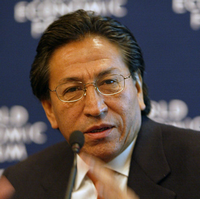LIMA, Peru -- As Peru approaches general elections on April 10, polls show that voters are leaning toward continuity, which might be expected for a country with one of the world's fastest-growing economies.
The leading contenders offer variations on the pro-business, open-market policies that have been the Peruvian status quo for two decades. The frontrunner, with 27 percent support in recent polls, is former President Alejandro Toledo, who governed from 2001-2006. A Stanford-educated economist, Toledo negotiated the country's free-trade agreement with the United States and oversaw moderate economic growth, but endured frequent scandals and protests during his presidency. Born into poverty in the Andean highlands, Toledo's indigenous roots have endeared him to many among Peru's indigenous and mestizo majority.
Vying for second place are Luis Castañeda, a two-term mayor of Lima, and Keiko Fujimori, the daughter of ex-president Alberto Fujimori, who won a congressional seat in 2006 and turned 35 -- the minimum age for a presidential candidate -- last May. January polls show that support for both Castañeda and Fujimori hovers around 20 percent.

